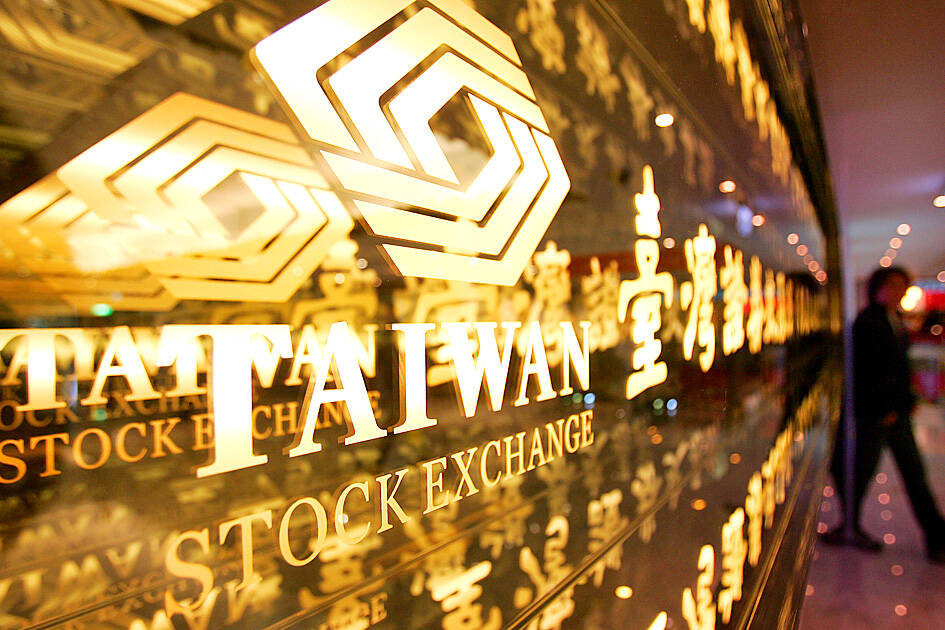Listed companies’ gains from overseas investments excluding China hit a 10-year high in the first half of the year, data released by the Financial Supervisory Commission (FSC) on Tuesday last week showed.
The firms made a combined profit of NT$624.8 billion (US$20.24 billion) in the first half, up NT$48.5 billion, or 8.42 percent, from a year earlier, because of rising shipping rates and robust demand for chips, it said.
The companies cover 724 firms listed on the Taiwan Stock Exchange and 561 companies on the Taipei Exchange, with the shipping, semiconductor and electronic component sectors reporting the largest gains, it said.

Photo: Maurice Tsai, Bloomberg
Benefiting from high freight rates, shipping companies reported a combined profit of NT$285 billion from their overseas investments, up 86.27 percent from a year earlier, while semiconductor firms posted a profit of NT$65.5 billion, up 34.5 percent annually, and electronic components suppliers made NT$84.9 billion in profit, up 5.47 percent, the data showed.
Accumulated overseas investments grew to NT$7.45 trillion as of the end of June, up by NT$307.2 billion from the end of last year, due to mergers and acquisitions and capital injections into foreign subsidiaries, the commission said.
Most new overseas investments were carried out by semiconductor companies, it said.
Meanwhile, listed companies reported a combined profit of NT$203.8 billion from their Chinese investments in the first six months, down 16.13 percent from a year earlier, but still the second-highest for the same period over the past decade, commission data showed.
The companies comprise 679 firms listed on the Taiwan Stock Exchange and 519 firms on the Taipei Exchange, the FSC said.
The commission attributed the decrease in Chinese investment gains to a disruption in the supply chain, especially for the computer, plastic and cement sectors, as well as to weaker market demand and rising raw material prices.
Accumulated Chinese investments rose to NT$2.64 trillion as of the end of June, up by NT$112.9 billion from the end of last year, the data showed.

KEEPING UP: The acquisition of a cleanroom in Taiwan would enable Micron to increase production in a market where demand continues to outpace supply, a Micron official said Micron Technology Inc has signed a letter of intent to buy a fabrication site in Taiwan from Powerchip Semiconductor Manufacturing Corp (力積電) for US$1.8 billion to expand its production of memory chips. Micron would take control of the P5 site in Miaoli County’s Tongluo Township (銅鑼) and plans to ramp up DRAM production in phases after the transaction closes in the second quarter, the company said in a statement on Saturday. The acquisition includes an existing 12 inch fab cleanroom of 27,871m2 and would further position Micron to address growing global demand for memory solutions, the company said. Micron expects the transaction to

Vincent Wei led fellow Singaporean farmers around an empty Malaysian plot, laying out plans for a greenhouse and rows of leafy vegetables. What he pitched was not just space for crops, but a lifeline for growers struggling to make ends meet in a city-state with high prices and little vacant land. The future agriculture hub is part of a joint special economic zone launched last year by the two neighbors, expected to cost US$123 million and produce 10,000 tonnes of fresh produce annually. It is attracting Singaporean farmers with promises of cheaper land, labor and energy just over the border.

US actor Matthew McConaughey has filed recordings of his image and voice with US patent authorities to protect them from unauthorized usage by artificial intelligence (AI) platforms, a representative said earlier this week. Several video clips and audio recordings were registered by the commercial arm of the Just Keep Livin’ Foundation, a non-profit created by the Oscar-winning actor and his wife, Camila, according to the US Patent and Trademark Office database. Many artists are increasingly concerned about the uncontrolled use of their image via generative AI since the rollout of ChatGPT and other AI-powered tools. Several US states have adopted

A proposed billionaires’ tax in California has ignited a political uproar in Silicon Valley, with tech titans threatening to leave the state while California Governor Gavin Newsom of the Democratic Party maneuvers to defeat a levy that he fears would lead to an exodus of wealth. A technology mecca, California has more billionaires than any other US state — a few hundred, by some estimates. About half its personal income tax revenue, a financial backbone in the nearly US$350 billion budget, comes from the top 1 percent of earners. A large healthcare union is attempting to place a proposal before